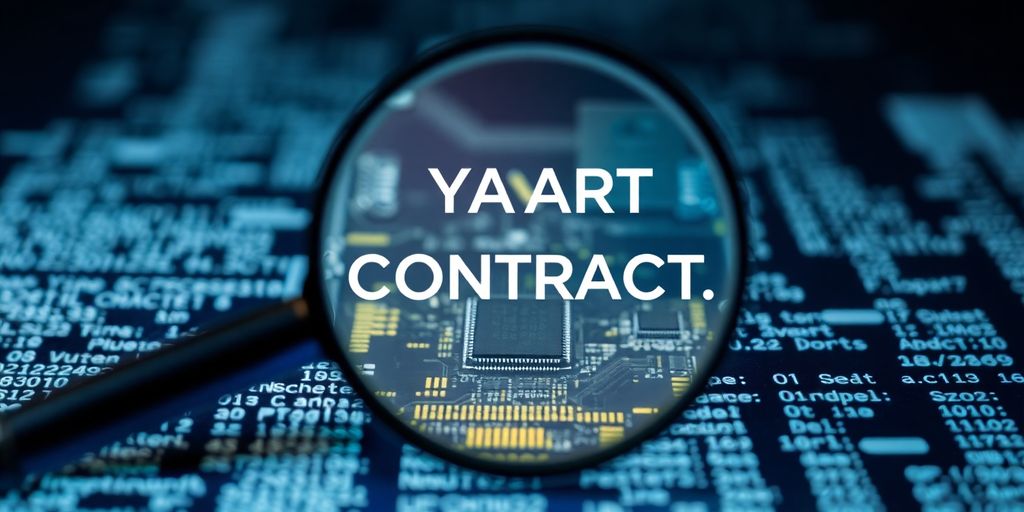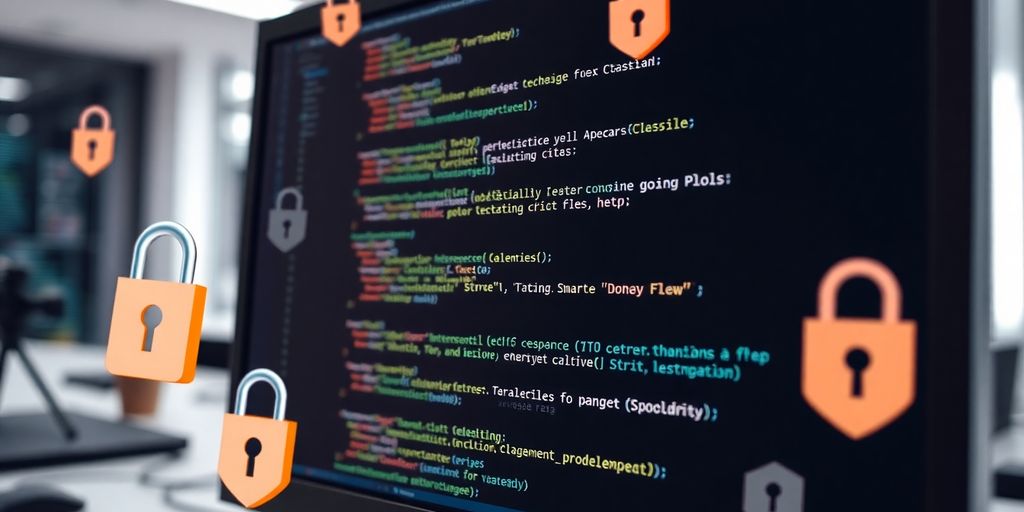In the fast-paced world of blockchain technology, smart contracts have become essential for automating agreements and transactions. However, with great innovation comes great risk. Ensuring the security of these contracts is vital to protect users and maintain trust in the system. That’s where audits come in. They play a key role in identifying vulnerabilities and ensuring that smart contracts operate as intended. Let’s explore how audits contribute to smart contract security and why they are crucial for any blockchain project.
Key Takeaways
- Smart contracts are self-executing agreements written in code, and their security is paramount to prevent financial losses.
- Audits are essential for identifying vulnerabilities in smart contracts and ensuring they function correctly before deployment.
- Neglecting audits can lead to serious consequences, including financial loss and damaged reputations for projects.
- The audit process involves both automated tools and manual testing to thoroughly check for weaknesses in the code.
- Keeping up with innovations in auditing practices helps enhance smart contract security and build user trust.
Understanding Smart Contract Security

Defining Smart Contracts
Okay, so what are smart contracts? I think of them as digital agreements written in code and stored on a blockchain. They automatically execute when certain conditions are met. Think of it like a vending machine: you put in the money (crypto), select your snack (function), and the machine (contract) dispenses it automatically. The beauty is that this happens without needing a middleman.
The Importance of Security in Smart Contracts
Security is everything when it comes to smart contracts. Because once a contract is deployed, it’s really hard to change. If there’s a flaw, it’s there for everyone to see and potentially exploit. The immutability of blockchains, while a strength, becomes a liability if the contract has vulnerabilities. A single mistake can lead to massive financial losses and a complete loss of trust in the project. It’s like building a house on a shaky foundation; it might look good at first, but it won’t stand the test of time.
Common Vulnerabilities in Smart Contracts
There are a few common issues I see cropping up again and again. Reentrancy attacks are a big one, where a contract calls another contract before updating its own state, allowing the attacker to repeatedly withdraw funds. Integer overflows and underflows can also cause problems, leading to unexpected behavior. And don’t even get me started on issues with access control, where unauthorized users can modify data or execute functions they shouldn’t. It’s a minefield out there!
It’s important to remember that smart contract security isn’t just about preventing hacks; it’s about building confidence in the entire ecosystem. When users feel safe, they’re more likely to participate and invest in blockchain projects. Security is the bedrock upon which decentralized applications are built.
The Significance of Smart Contract Audits
Why Audits Matter
I believe that smart contract audits are super important. They’re like a health check for your code, making sure everything runs smoothly and securely. Think of it this way: you wouldn’t launch a rocket without checking all the systems, right? Same goes for smart contracts. They often handle real money and sensitive data, so any little flaw can cause big problems. Audits help catch those flaws before they become disasters. The need for strong security has only continued to increase.
Consequences of Neglecting Audits
Skipping an audit? That’s like playing with fire. I’ve seen projects lose millions because of simple coding errors that could have been caught with a proper audit. It’s not just about the money, though. A security breach can ruin a project’s reputation and kill user trust. No one wants to use a platform that’s known for getting hacked. It’s better to spend the time and money on an audit than to risk everything on a flawed contract.
Building Trust Through Audits
Audits aren’t just about finding problems; they’re about building trust. When a project has been audited by a reputable firm, it sends a message to users: "We take security seriously." This can make a huge difference in attracting users and investors. Plus, audits often lead to improvements in the code, making the contract more efficient and user-friendly. It’s a win-win situation. I think that transparency is key in the blockchain world, and audits are a big part of that.
The Audit Process Explained

Initial Code Review
Okay, so when I start an audit, the first thing I do is really dig into the code. I’m not just skimming; I’m trying to understand everything it’s supposed to do and how it’s doing it. It’s like reading a book, but instead of enjoying the story, I’m looking for plot holes and inconsistencies. This involves:
- Understanding the project’s goals.
- Reviewing the architecture.
- Identifying key functionalities.
It’s important to get this initial understanding right because it sets the stage for everything else. If I don’t know what the code should be doing, I can’t effectively find out what it’s doing wrong.
Automated Tools in Auditing
I’m not going to lie; I love my automated tools. They’re like having a team of tireless assistants who can check every line of code for common mistakes. These tools can catch things that I might miss, especially when dealing with large or complex contracts. I use tools for:
- Static analysis: Checks the code without running it.
- Fuzzing: Throws random inputs at the contract to see if it breaks.
- Symbolic execution: Explores all possible execution paths.
These tools are great, but they’re not perfect. They can generate false positives, and they can miss more subtle vulnerabilities. That’s why I always follow up with manual testing.
Manual Testing Techniques
Manual testing is where I really get to put on my detective hat. I’m trying to think like an attacker, trying to find ways to exploit the contract. This involves:
- Writing custom test cases.
- Performing security reviews.
- Analyzing the code for logic errors.
I also spend a lot of time looking at how the contract interacts with other contracts and with the outside world. This is where things can get really interesting, because vulnerabilities often arise from unexpected interactions. It’s a bit like trying to predict how a Rube Goldberg machine will fail – you have to consider all the different parts and how they interact. It’s time-consuming, but it’s also the most rewarding part of the audit process.
Identifying Vulnerabilities Through Audits
Common Vulnerabilities Detected
Smart contract audits are really important for spotting problems before they cause big issues. I’ve seen audits catch all sorts of things, from simple coding errors to really complex security flaws. Some of the most common issues I run into include:
- Reentrancy attacks, where a contract calls another contract and then gets called back before the first call is finished. This can lead to unexpected behavior and loss of funds.
- Integer overflow or underflow, which can cause calculations to go wrong and lead to incorrect balances or other problems.
- Timestamp dependence, where the contract’s behavior depends on the block timestamp, which can be manipulated by miners.
- Access control issues, where unauthorized users can perform actions they shouldn’t be able to.
Case Studies of Exploited Contracts
It’s one thing to talk about vulnerabilities in theory, but it’s another to see how they’ve been exploited in the real world. There have been some pretty high-profile cases of smart contracts getting hacked, and these serve as important lessons for everyone in the industry. For example, the DAO hack in 2016 was a major wake-up call. A flaw in the DAO’s code allowed an attacker to drain a significant amount of ether. This event really highlighted the importance of thorough auditing and security best practices.
Another example is the Parity wallet hack, where a vulnerability in the wallet’s code allowed an attacker to freeze millions of dollars worth of ether. These incidents show that even seemingly small flaws can have huge consequences.
The Role of Auditors in Risk Assessment
Auditors don’t just find vulnerabilities; they also help assess the risk associated with those vulnerabilities. This means figuring out how likely it is that a vulnerability will be exploited, and what the potential impact would be. Auditors will look at things like:
- The complexity of the code
- The amount of money at stake
- The potential attack vectors
By assessing these risks, auditors can help developers prioritize which vulnerabilities to fix first. They can also help developers make informed decisions about whether to deploy a contract at all, or whether to make changes to the design to reduce the risk of exploitation. It’s all about making sure the project is as safe as it can be before it goes live.
Enhancing Smart Contract Functionality

Smart contract audits aren’t just about finding problems; they’re also a chance to make things better. I see audits as a way to fine-tune a contract, making it more efficient and user-friendly. It’s like taking your car in for a check-up – you want to fix any issues, but you also want to improve its performance.
Optimization Recommendations
Auditors often provide suggestions on how to streamline the code. This can involve rewriting certain sections to use less gas or reorganizing the logic for better clarity. It’s about making the contract as lean and mean as possible. For example, I might suggest using more efficient data structures or reducing the number of storage operations. These small tweaks can add up to significant improvements in performance.
Reducing Gas Costs
Gas costs are a big deal on the blockchain. High gas costs can make a contract unusable, especially for smaller transactions. Auditors can help identify areas where gas usage can be reduced. This might involve:
- Optimizing loop structures
- Using cheaper opcodes
- Reducing data storage
Reducing gas costs not only makes the contract more affordable for users but also reduces the overall load on the blockchain network. It’s a win-win situation.
Improving User Experience
User experience is often overlooked in smart contracts, but it’s just as important as security. A contract that’s difficult to use won’t be adopted, no matter how secure it is. Auditors can provide feedback on how to make the contract more user-friendly. This might involve:
- Simplifying function calls
- Providing clear error messages
- Adding helpful documentation
Ultimately, the goal is to make the contract as easy as possible for users to interact with. By focusing on optimization, gas reduction, and user experience, I believe audits can play a key role in composable smart contracts and making blockchain technology more accessible to everyone.
The Role of Innovation in Auditing
It’s wild how fast things change, especially in the blockchain world. Smart contract audits? They’re not stuck in the past either. To keep up with new threats and tech, we’ve got to get creative with how we check these contracts. It’s not just about finding bugs; it’s about making sure the whole system is solid.
Emerging Tools and Technologies
I’m seeing some cool stuff pop up. Formal verification, for example, is like proving your code works with math. It’s way more solid than just testing. Then there’s AI. Imagine a program that can scan code for problems faster than any human. These tools aren’t just nice to have; they’re becoming essential.
Collaboration in the Blockchain Community
It’s not a solo mission. Auditors, developers, researchers—we all need to talk. Sharing what we know makes everyone better. Plus, getting regulators involved helps set some ground rules. Think of it as a team effort to build trust in the whole blockchain thing.
Standardizing Audit Practices
We need to get on the same page. Right now, audits can be all over the place. Setting some standards means everyone knows what to expect. It’s like having a recipe for a cake—you know what ingredients and steps to follow. This makes audits more reliable and easier to compare.
Here’s a quick look at why standards matter:
- Consistency: Everyone follows the same rules.
- Trust: People know what they’re getting.
- Efficiency: Audits become smoother and faster.
Real-World Examples of Audit Impact
High-Profile Audit Successes
It’s easy to talk about audits in theory, but what about when they actually make a difference? Well, there are plenty of examples where thorough audits have saved projects from disaster. Take, for instance, the MakerDAO’s multi-collateral Dai (MCD) system. The successful audit and launch of MCD showed how important it is to have a good audit to prevent problems in complex smart contract systems. Similarly, Compound Finance, a leading lending protocol in DeFi, underwent smart contract audits. These audits helped contribute to its growth and acceptance in the DeFi space. These cases highlight how smart contract audits can lead to success.
Lessons Learned from Failures
Of course, not every story has a happy ending. The 2016 DAO hack is a stark reminder of what can happen when security isn’t taken seriously enough. While the DAO did have some level of review, the exploit was so bad that it showed the need for more thorough audits in the future. Another example is the Parity Wallet incident in 2017, where a bug in the smart contract library froze over $150 million worth of Ether. These failures teach us that the stakes are high, and even small vulnerabilities can have big consequences.
These incidents underscore the importance of continuous vigilance and improvement in audit practices. The blockchain space is constantly evolving, and so too must our approach to security.
The Ripple Effect on Market Confidence
When a smart contract is found to have a security breach, it can be disastrous. Beyond the immediate financial losses, it can also damage the project’s reputation in the long run. Investors and users are likely to lose faith in a compromised platform, which leads to a loss of market confidence. On the other hand, when projects prioritize security and undergo successful audits, it can have a positive ripple effect. It builds trust in the platform, attracts more users, and encourages further investment in the blockchain space. It’s all connected.
Future Trends in Smart Contract Audits

Adapting to Evolving Threats
The world of blockchain is always changing, and so are the threats to smart contracts. As an auditor, I see that we need to constantly update our methods to stay ahead of new attack strategies. This means not only keeping up with the latest vulnerabilities but also anticipating what’s coming next. It’s a bit like a cybersecurity arms race, and we need to be proactive. We need to be ready to handle new kinds of risks as they show up in the digital space.
The Rise of Formal Verification
Formal verification is becoming a bigger deal in smart contract audits. It’s a way of mathematically proving that a contract will do what it’s supposed to do. This is a big step up from just testing the code. It gives us a much higher level of confidence that the contract will work correctly, even in unexpected situations. I think we’ll see more and more projects using formal verification as they try to make their contracts as secure as possible.
Integrating AI in Auditing Processes
AI is starting to change how we do audits. AI tools can help us find vulnerabilities faster and more accurately than ever before. They can analyze huge amounts of code and spot patterns that might indicate problems. I think AI will become an important part of the auditing process, helping us to make smart contracts safer and more reliable. It’s not going to replace human auditors, but it will definitely make our work easier and more effective.
The future of smart contract audits is all about staying flexible and using new technologies to improve our work. We need to be ready to adapt to new threats, embrace formal verification, and use AI to make our audits more efficient. By doing this, we can help make the blockchain world a safer place for everyone.
Best Practices for Conducting Audits
Establishing Clear Audit Objectives
Before diving into an audit, it’s really important to know what you’re trying to achieve. I always start by defining specific goals. What are the key areas of concern? What level of assurance are we aiming for? A vague objective leads to a vague audit, and that’s not helpful to anyone. Think about it: are we mostly worried about potential financial exploits, or are we more focused on ensuring the contract behaves as expected under normal use? Knowing this upfront helps focus the audit and makes the whole process way more efficient.
Engaging Experienced Auditors
This might seem obvious, but it’s worth saying: get people who know what they’re doing. I look for auditors with a proven track record, ideally with experience in similar projects. It’s not just about technical skills; it’s also about their ability to communicate findings clearly and offer practical solutions. Check their background, ask for references, and don’t be afraid to ask tough questions about their approach. A good auditor is an investment, not an expense.
Continuous Monitoring and Updates
An audit is not a one-time thing. The blockchain space moves fast, and new vulnerabilities are discovered all the time. I recommend setting up a system for continuous monitoring and regular updates. This could involve automated tools, ongoing code reviews, or even bug bounty programs. The goal is to stay ahead of potential threats and ensure the contract remains secure over time. Think of it like this:
- Regular code reviews
- Automated vulnerability scanning
- Staying updated on the latest security threats
It’s easy to think of an audit as a ‘set it and forget it’ kind of thing, but that’s a mistake. Smart contracts are living things, and they need constant care and attention. Treat your audit like a health checkup, not a cure-all.
Final Thoughts on Smart Contract Audits
In wrapping up, it’s clear that audits play a vital role in the world of smart contracts. They’re not just a box to check off; they’re essential for spotting potential issues before they become major problems. We’ve seen how even small mistakes can lead to huge financial losses and damage to reputations. By investing in thorough audits, developers can protect their projects and build trust with users. It’s all about creating a safer environment for everyone involved in blockchain technology. So, whether you’re a developer or a user, remember that a solid audit can make all the difference in ensuring that smart contracts work as they should.
Frequently Asked Questions
What is a smart contract?
A smart contract is a type of agreement that is written in computer code. It automatically carries out the terms of the agreement without needing a middleman.
Why is security important for smart contracts?
Security is crucial because if there are any mistakes in the code, it can lead to big financial losses or damage the trust in a project.
What can happen if a smart contract is not audited?
If a smart contract is not audited, it might have hidden problems that could be exploited, leading to loss of money and trust from users.
What does a smart contract audit involve?
A smart contract audit involves checking the code for errors, testing it for vulnerabilities, and suggesting improvements to make it safer.
What are common issues found in smart contracts?
Common issues include coding mistakes, security flaws, and problems that could allow hackers to exploit the contract.
How can audits help improve smart contracts?
Audits can help by finding weaknesses in the code and suggesting ways to make it more efficient and less costly to use.
What tools are used in smart contract audits?
Auditors use both automated tools and manual testing methods to find problems in the smart contract code.
Why is it important to keep updating audits?
It’s important to update audits regularly because new threats can emerge, and keeping the contract secure is essential for maintaining trust.





